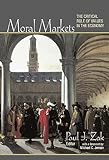Moral Markets : The Critical Role of Values in the Economy / ed. by Paul J. Zak.
Material type: TextPublisher: Princeton, NJ : Princeton University Press, [2010]Copyright date: ©2008Edition: Course BookDescription: 1 online resource (392 p.) : 12 halftones. 12 line illus. 7 tablesContent type:
TextPublisher: Princeton, NJ : Princeton University Press, [2010]Copyright date: ©2008Edition: Course BookDescription: 1 online resource (392 p.) : 12 halftones. 12 line illus. 7 tablesContent type: - 9780691135236
- 9781400837366
- 174
- HB72
- online - DeGruyter
- Issued also in print.
| Item type | Current library | Call number | URL | Status | Notes | Barcode | |
|---|---|---|---|---|---|---|---|
 eBook
eBook
|
Biblioteca "Angelicum" Pont. Univ. S.Tommaso d'Aquino Nuvola online | online - DeGruyter (Browse shelf(Opens below)) | Online access | Not for loan (Accesso limitato) | Accesso per gli utenti autorizzati / Access for authorized users | (dgr)9781400837366 |
Frontmatter -- Contents -- Foreword -- Introduction -- Preface: Is Free Enterprise Values in Action? -- Acknowledgments -- Contributors -- Part I: Philosophical Foundations of Values -- One. The Stories Markets Tell -- Two. Free Enterprise, Sympathy, and Virtue -- Three. The Status of Moral Emotions in Consequentialist Moral Reasoning -- Part II. Nonhuman Origins of Values -- Four. How Selfish an Animal? -- Five. Fairness and Other-Regarding Preferences in Nonhuman Primates -- Part III. The Evolution of Values and Society -- Six. The Evolution of Free Enterprise Values -- Seven. Building Trust by Wasting Time -- Part IV. Values and the Law -- Eight. Taking Conscience Seriously -- Nine. Trustworthiness and Contract -- Ten. The Vital Role of Norms and Rules in Maintaining Open Public and Private Economies -- Eleven. Values, Mechanism Design, and Fairness -- Part V. Values and the Economy -- Twelve. Values and Value -- Thirteen. Building a Market -- Fourteen. Corporate Honesty and Business Education -- Fifteen. What's a Business For? -- Index
restricted access online access with authorization star
http://purl.org/coar/access_right/c_16ec
Like nature itself, modern economic life is driven by relentless competition and unbridled selfishness. Or is it? Drawing on converging evidence from neuroscience, social science, biology, law, and philosophy, Moral Markets makes the case that modern market exchange works only because most people, most of the time, act virtuously. Competition and greed are certainly part of economics, but Moral Markets shows how the rules of market exchange have evolved to promote moral behavior and how exchange itself may make us more virtuous. Examining the biological basis of economic morality, tracing the connections between morality and markets, and exploring the profound implications of both, Moral Markets provides a surprising and fundamentally new view of economics--one that also reconnects the field to Adam Smith's position that morality has a biological basis. Moral Markets, the result of an extensive collaboration between leading social and natural scientists, includes contributions by neuroeconomist Paul Zak; economists Robert H. Frank, Herbert Gintis, Vernon Smith (winner of the 2002 Nobel Prize in economics), and Bart Wilson; law professors Oliver Goodenough, Erin O'Hara, and Lynn Stout; philosophers William Casebeer and Robert Solomon; primatologists Sarah Brosnan and Frans de Waal; biologists Carl Bergstrom, Ben Kerr, and Peter Richerson; anthropologists Robert Boyd and Michael Lachmann; political scientists Elinor Ostrom and David Schwab; management professor Rakesh Khurana; computational science and informatics doctoral candidate Erik Kimbrough; and business writer Charles Handy.
Issued also in print.
Mode of access: Internet via World Wide Web.
In English.
Description based on online resource; title from PDF title page (publisher's Web site, viewed 30. Aug 2021)


